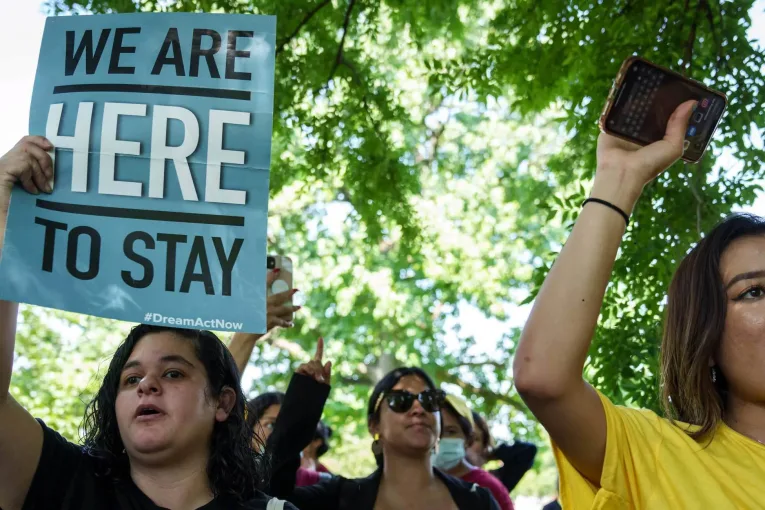
If this notorious policy initiative is implemented, millions would be denied access to an attorney in immigration court.
By now, you’ve likely heard a lot about Project 2025. The notorious policy road map lays out a vision that, if implemented, would completely transform the United States federal government, with catastrophic results.
One of the most devastating aspects of Project 2025 is its plan to reshape the current U.S. immigration system. Many of its policies are designed to initiate mass deportations. This would be a disaster for the entire country—separating families, damaging the economy, and uprooting millions of people who have called the United States their home for decades.
Legal representation is the most effective tool available to protect people facing deportation in our complex immigration system. It is already tremendously difficult for immigrants to secure a lawyer, and Project 2025 would make it even more so. It targets critical deportation defense efforts for divestment and adds barriers for legal service providers that would leave hundreds of thousands of established and newly-arrived immigrants without the support they need to defend themselves against deportation and family separation fairly.
Five things you should know about how Project 2025 would impact deportation defense:
- State and local funding for legal assistance programs would be cut or restricted.
Under Project 2025’s proposals, states and localities that fund immigration legal services and other programs to support safe and stable immigrant communities would see their federal funding threatened. This could leave many more people without legal guidance if state and local governments are pressured to curtail investments in immigration legal services. Service providers in communities where jurisdictions may decide to defund representation programs would be in jeopardy. - Support for individuals, families, and children seeking safety would be gutted.
Project 2025 would make it much harder for people seeking asylum and others at risk of deportation to apply for protection and understand their rights in immigration court. The plan would cut funding from the already limited asylum aid and legal services programs, including protections and programs supporting unaccompanied children. - Lawyers and legal service providers would face increased barriers.
Stricter vetting requirements and administrative burdens would make it harder for attorneys and organizations to represent immigrants under federal programs. Additionally, legal providers may face criminal penalties if they fail to comply with new immigration enforcement policies. The proposal also includes restrictions that would prevent many legal service providers from employing skilled advocates who are not U.S. citizens—even those authorized to work in the country, a significant burden on a field already facing hiring and retention challenges. These additional obstacles would have a chilling effect on legal aid organizations, leading to fewer service providers and legal professionals—and thus, fewer people represented in immigration court. - Deportations would be fast-tracked.
Expanding expedited removal policies under Project 2025 would allow the government to deport people without a court hearing. It would also allow for the removal, arrest, and detention of immigrants without a warrant. With little or no time to seek legal help, immigrants would be removed from the United States without due process. - Immigration judges would have stricter rules that lead to unfair court decisions.
In 2018, the Department of Justice imposed case completion quotas on immigration judges. Project 2025 would reimplement that policy, limiting judges’ ability to manage their dockets independently and forcing them to reach decisions more quickly. This would give people less time to secure legal representation and prepare their defense, leading to unfair outcomes. Judges facing pressure to meet quotas may be less inclined to grant continuances for securing an attorney.
Working toward a better future.
If implemented, Project 2025 would make it significantly harder for people to legally defend themselves against deportation, leading to the separation of families on a massive scale and throwing the U.S. immigration system into chaos.
Luckily, alternative policy proposals do exist, ones that would allow everyone living in our communities to live in safety, security, and stability. The Fairness to Freedom Act would establish the right to a federally funded lawyer for every person facing deportation who cannot afford legal representation. Additionally, the SHIELD Act would provide essential support to organizations providing legal services to people in immigration court.
Research shows that people in the United States support government-supported access to representation in immigration court. Together, these bills would help to build the nationwide infrastructure necessary to provide an attorney to every person facing deportation, promoting much-needed fairness in the outdated U.S. immigration system and helping ensure that every person who arrives at our border has a chance at safety and justice.
Originally published by Vera Institute of Justice
Shayna Kessler Initiative Director, Advancing Universal Representation for Vera Institute of Justice.